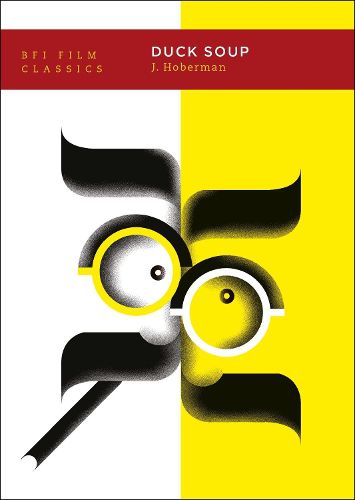Readings Newsletter
Become a Readings Member to make your shopping experience even easier.
Sign in or sign up for free!
You’re not far away from qualifying for FREE standard shipping within Australia
You’ve qualified for FREE standard shipping within Australia
The cart is loading…






The Marx Brothers are universally considered to be classic Hollywood’s preeminent comedy team and Duck Soup is generally regarded as their quintessential film. A topical satire of dictatorship and government in general, the movie was a critical failure and box-office let-down on its initial release in 1933.
J. Hoberman’s study of the film traces its reputation history, from the initial disappointment of its release, to its rise to cult status in the 1960s when the Marx’s anarchic, anti-establishment humor seemed again timely. Hoberman places Duck Soup, alongside analogous comedies-Dr. Strangelove (1964), the Beatles films, Morgan! (1966), The President’s Analyst (1967) and The Producers (1968). It attained canonical stature as a touchstone for Woody Allen and would be recognized by the Library of Congress in the 1990s.
Hoberman’s analysis provides a historical and political context as well as an in-depth production history, drawing on primary sources and emphasizing director McCarey’s prior work along with the Marx Brothers as well as the situation at Paramount, a substantial synopsis, and an account of the movie’s initial reception, concluding with its subsequent elevation to comic masterpiece.
$9.00 standard shipping within Australia
FREE standard shipping within Australia for orders over $100.00
Express & International shipping calculated at checkout
The Marx Brothers are universally considered to be classic Hollywood’s preeminent comedy team and Duck Soup is generally regarded as their quintessential film. A topical satire of dictatorship and government in general, the movie was a critical failure and box-office let-down on its initial release in 1933.
J. Hoberman’s study of the film traces its reputation history, from the initial disappointment of its release, to its rise to cult status in the 1960s when the Marx’s anarchic, anti-establishment humor seemed again timely. Hoberman places Duck Soup, alongside analogous comedies-Dr. Strangelove (1964), the Beatles films, Morgan! (1966), The President’s Analyst (1967) and The Producers (1968). It attained canonical stature as a touchstone for Woody Allen and would be recognized by the Library of Congress in the 1990s.
Hoberman’s analysis provides a historical and political context as well as an in-depth production history, drawing on primary sources and emphasizing director McCarey’s prior work along with the Marx Brothers as well as the situation at Paramount, a substantial synopsis, and an account of the movie’s initial reception, concluding with its subsequent elevation to comic masterpiece.